Best Web3 Browsers in 2025
June 02, 2025

Imagine opening a browser and stepping into a world where you own your data, control your digital identity, and earn crypto just for scrolling. No middlemen. No invasive trackers. Just a seamless bridge to the decentralized internet.
Welcome to the age of Web3 browsers — not just upgrades to Chrome or Firefox, but powerful tools designed for the blockchain generation. These new-generation browsers are revolutionising the way we use the internet, combining privacy, utility, and economic independence in one window.
This article is intended to answer questions about what a Web3 browser, what are the best options on the market today, how to choose the right one and what the future holds for Web3 browsing technology.
Key Takeaways
- Web3 browsers go beyond browsing — they let users interact with decentralized apps (DApps), manage wallets, and own their online identity.
- Privacy and decentralisation are core values, with many browsers offering built-in wallets, VPNs, and ad-blocking as standard.
- Whether you’re a casual user, creator, or DeFi trader, there’s a Web3 browser tailored to your needs — from Brave to MetaMask to Beaker.
What Is a Web3 Browser?
A Web3 browser is a high-tech type of internet browser specifically designed to explore the decentralized web — the new layer of the internet around blockchain technology.
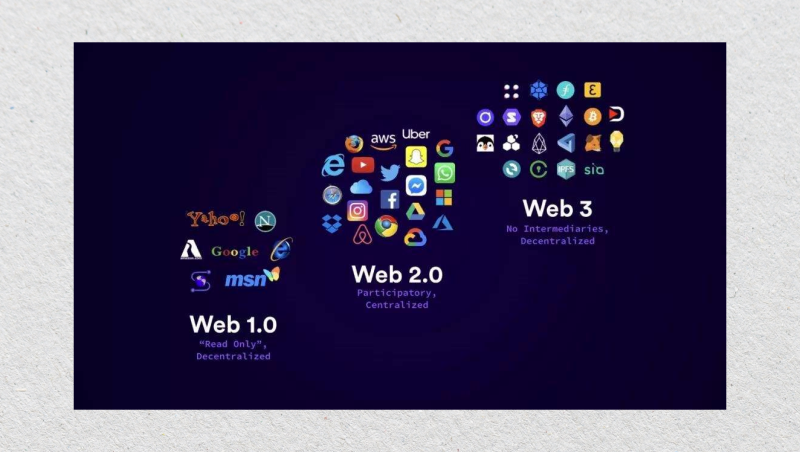
In contrast to the browsers the world used to use to access content from centralized servers, your Web3 browser is your portal to a world where users are in charge, the data is distributed over networks rather than residing in a centralized point, and middlemen are increasingly taken out of the mix.
With a Web3 browser, you can do far more than just surf the web. It allows you to interact directly with decentralized applications (DApps), manage your cryptocurrency wallet, trade tokens, buy and sell NFTs, and access DeFi tools — all from one place. You won’t need to install extra wallet extensions or constantly log in and out of services.
Even better, many Web3 browsers reward you for browsing, offering crypto tokens in exchange for your engagement and attention. In short, it’s a more innovative, secure, and user-centric way to experience the internet — built for the blockchain generation.
Fast Fact
Web3 browsers like Brave and Puma now reward users with crypto tokens just for browsing — giving value back to users instead of big tech companies.
Top 7 Best Web3 Browsers in 2025
As blockchain adoption grows, Web3 browsers quickly become essential tools for navigating the decentralized internet. Whether deep into DeFi, minting NFTs, or exploring the new wave of online privacy, the right browser can make all the difference.
Here are the top 7 Web3 browsers in 2025, each with strengths and standout features.
Brave Browser
Brave has long stood out as the browser for people who value online privacy without compromise. It blocks ads, cookies, and trackers the moment you install it — no setup required.
But what really makes Brave special is its built-in Basic Attention Token (BAT) rewards system. You can choose to view carefully curated ads and, in return, earn BAT tokens — a rare win-win in the digital world.
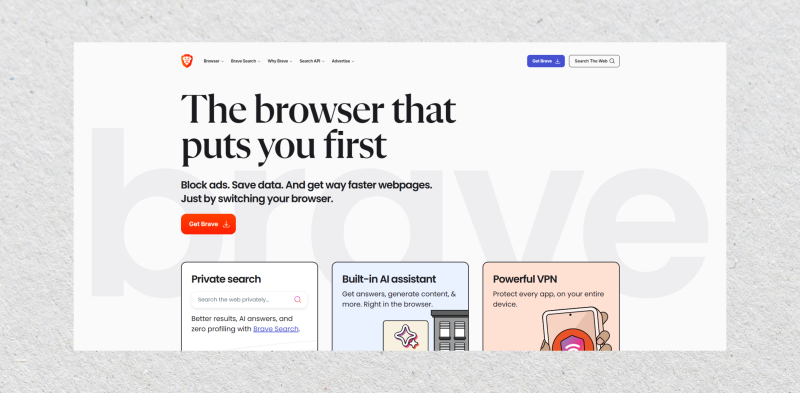
Beyond privacy and rewards, Brave includes a native crypto wallet that supports Ethereum and other assets. You can also interact with decentralized apps (DApps) and NFTs without downloading extra plugins. It feels like fast and familiar Chrome, but it already has all the Web3 tools.
Opera Crypto Browser
Opera took years of experience building sleek, user-friendly browsers and turned that into a complete Web3 ecosystem. The Opera Crypto Browser is designed for beginners and crypto veterans, offering everything from a non-custodial wallet to a curated DApp store and a specialized “Crypto Corner” tab for news, asset tracking, and price charts.
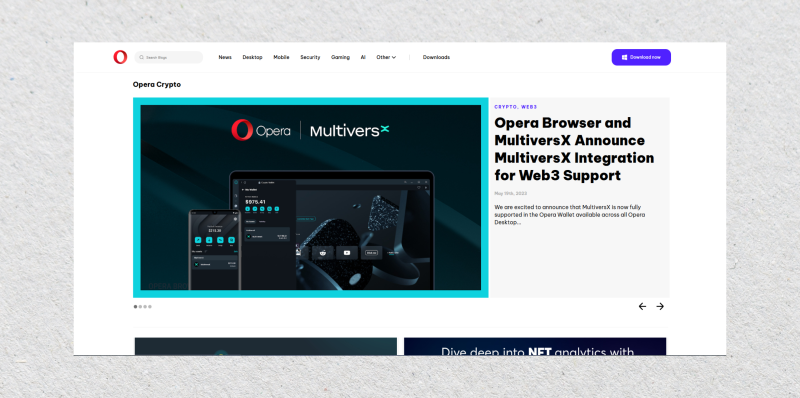
It supports multiple blockchains — including Ethereum, Polygon, and BNB Chain — meaning you’re not locked into a single ecosystem. The built-in NFT gallery lets you view and manage your digital collectible without visiting separate platforms.
MetaMask Mobile Browser
MetaMask and Ethereum are synonymous with each other, and their browser puts that capability in your pocket. Beyond being a wallet, the MetaMask application incorporates a fully featured browser specifically designed to directly engage with Ethereum-based DApps such as Uniswap, Aave, and OpenSea.
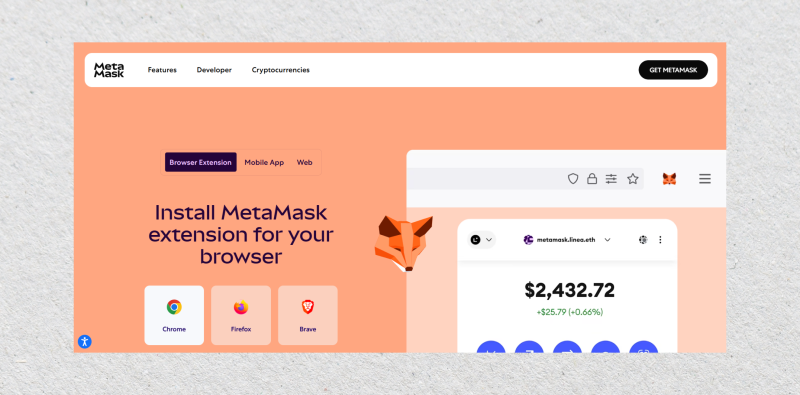
Everything is streamlined: you can connect to a DApp, sign transactions, swap tokens, and manage your NFT collection — all without ever leaving the app. And because it’s mobile-first, you get a responsive and straightforward experience even when moving.
Puma Browser
Puma Browser takes a refreshing approach to the internet by putting content creators first. Instead of the traditional ad model, Puma supports Coil, which allows you to make small, automatic donations (micropayments) to websites and creators you spend time on.
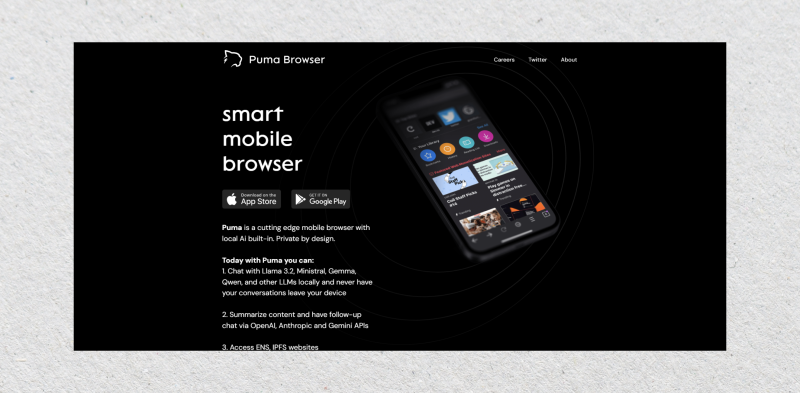
This browser is also incredibly lightweight and runs fast on mobile, all while protecting your privacy by blocking trackers and invasive ads. Its clean, minimal interface and support for emerging Web Monetization standards make it ideal for people who want to support ethical web practices — or simply browse in peace.
Aurox Browser
Aurox is designed with crypto power users in mind — specifically, those who live and breathe decentralized finance. It’s a part browser and part trading workstation that gives you access to real-time charts, trading signals, portfolio tracking, and DApps.
Unlike other browsers that keep you toggling between wallets, exchanges, and dashboards, Aurox puts it all in one place. It also includes intelligent contract scanning and security warnings to help protect users from scammy sites or faulty contracts.
Osiris Browser
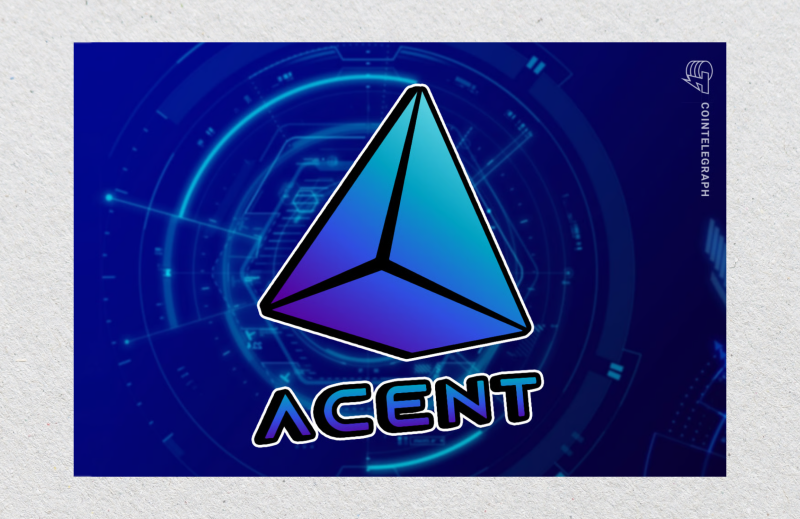
Osiris is a browser geared towards users who value freedom, protection, and privacy. It contains a built-in VPN, so your online activities remain private when visiting blocked or censored websites. There is also a built-in ad blocker and a built-in wallet system known as the Metawallet system that accommodates numerous crypto assets.
Among its most notable aspects is blockchain-based DNS support, which allows you to access decentralized websites using regular domain name system names. That is, you can use the web the way it was originally intended — decentralized, open, and community-owned.
Beaker Browser
Beaker is different from any other browser listed here. Rather than assist you in browsing the decentralized web, Beaker empowers you to build it.
Using the Hypercore protocol, anyone can host and build their own websites peer-to-peer — and do it entirely without depending upon a hosting company or centralized server.
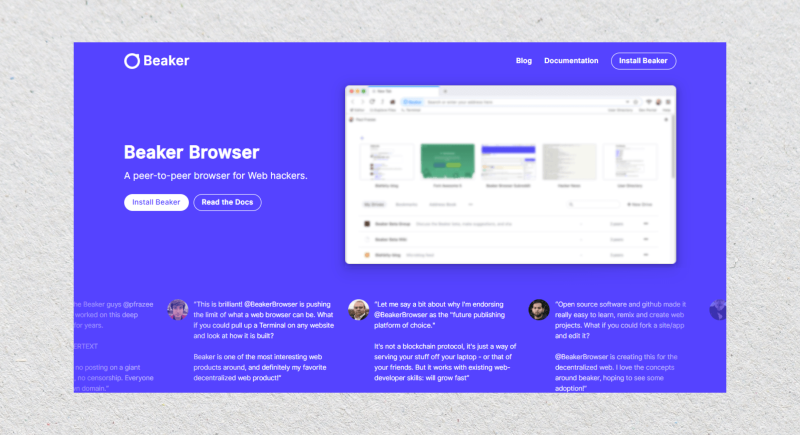
This is empowering for developers, educators, social activists, or anyone who wishes to have total mastery over their digital lives. Beaker is somewhat experimental and too advanced for brand-new beginners, but it’s a great resource if you want to take a hands-on role in shaping the web’s future.
What Makes a Good Web3 Browser?
As we transition into the age of decentralized technology, the traditional web browser simply doesn’t cut it anymore. A good Web3 browser isn’t just about speed and clean design — it’s your secure gateway to the decentralized web. But what exactly sets a Web3 browser apart?
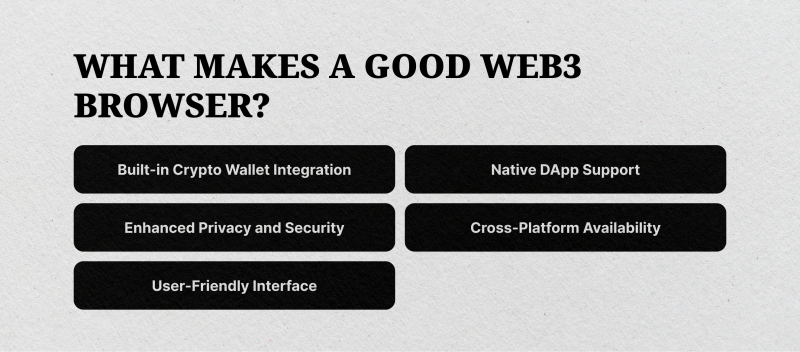
Built-in Crypto Wallet Integration
One key feature of any good Web3 browser is the native crypto wallet. This is more than just a fancy add-on — it is a fundamental differentiator for dealing with decentralized applications (DApps), token management, and crypto transaction completion without relying on third-party add-ons.
Whether it’s sending Ethereum, storing NFTs, or exploring DeFi protocols, seamless wallet functionality within the browser makes a huge difference in user experience.
Native DApp Support
Web3 browsers are designed to natively understand the language of the decentralized web. That is to say, they are able to directly address blockchain-based applications, ranging from decentralized exchanges such as Uniswap to gaming and NFT marketplaces.
A good Web3 browser should include a strong DApp directory or explorer, so it is easy to find and make use of such applications without the need to switch back and forth between various tools or levels of software.
Enhanced Privacy and Security
Privacy is the core pillar of the Web3 revolution, and the ideal Web3 browsers all share the same ethos. Check their built-in ad blockers, tracker blockers, and anonymous browsing options.
On the security front, the browser should have phishing protection, secure browsing and connections, and frequent updating to safeguard users from emerging threats — particularly in the sometimes turbulent crypto environment.
Cross-Platform Availability
With people accessing digital assets while mobile, a good Web3 browser must operate across platforms. Whether you’re using a notebook computer, tablet, or smartphone, the experience should be smooth and seamless.
Syncing bookmarks and wallets, and providing platform security and mobile-friendly interfaces are the hallmarks of a progressive browser.
User-Friendly Interface
Decentralized tech is strong, but can be overwhelming to new users. A good Web3 browser fills the gaps with a user-friendly and minimalistic interface.
It needs to make processes such as exchanging tokens, accessing DApps, or monitoring transaction history as easy as humanly possible — without demanding users to be blockchain savvy.
How to Choose the Right Web3 Browser for You?
The decentralized internet is exciting but can also feel overwhelming — especially with so many Web3 browsers claiming to be the “best.” The truth is, there’s no one-size-fits-all solution.
The right Web3 browser depends on you: your habits, your tech comfort level, your goals in the crypto space, and even your stance on privacy.
Here’s how to navigate your options and find the Web3 browser that fits your needs — not just one that looks shiny on paper.
Consider Your Experience Level
If you’re just beginning your journey into the Web3 space, managing crypto wallets or interacting with decentralized apps (DApps) might feel daunting. That’s perfectly normal. In this case, it’s wise to start with a Web3 browser that offers a smooth, beginner-friendly experience.
Browsers like Brave or Opera Crypto Browser are ideal because they feel familiar — much like Chrome — yet come packed with integrated Web3 features. They allow you to explore without being overwhelmed by technical complexity.
On the other hand, if you’re already comfortable navigating DeFi platforms, trading tokens, or using crypto wallets, you might want something more advanced.
MetaMask Mobile and Aurox provide more in-depth tools and customization for users already embedded in the decentralized world, and enjoy greater control over their Web3 activities.
Identify What You Actually Need from Web3
If you value earning while browsing, Brave will appeal to you — it lets you collect BAT tokens simply for viewing opt-in ads. If you spend time with Ethereum-based DApps or collecting NFTs, MetaMask Mobile offers direct access and easy management.
For those heavily into DeFi trading, Aurox delivers advanced analytics and real-time tools in-browser. If you’re passionate about supporting content creators or exploring new ways to monetize the web, Puma Browser aligns with that vision.
And if your top concern is maintaining privacy or bypassing censorship, Osiris is built with those needs in mind. Want to host your own site without relying on centralized servers? The beaker is uniquely designed for precisely that.
The key is to match your goals with the browser’s strengths — it makes all the difference.
Mobile vs. Desktop Usage
Where and how you plan to use your Web3 browser matters. If you’re always on your phone, then a browser optimized for mobile is essential.
MetaMask Mobile and Puma offer a smooth experience for users who prefer managing their crypto lives from a smartphone, including built-in wallets and support for DApps.
However, if you prefer researching, analysing charts, or managing digital assets on a larger screen, you’ll benefit from desktop-first browsers like Brave, Opera, or Aurox. These provide more screen space, multitasking capabilities, and access to full-featured dashboards, beneficial for traders and creators.
Privacy vs. Performance Trade-Offs
Not every browser strikes the same balance between privacy and performance. If online anonymity and control over your data are non-negotiable, browsers like Brave, Puma, and Osiris should be on your list. They block trackers and intrusive ads out of the gate, and some even offer built-in VPNs or support decentralized DNS.
However, it’s worth noting that hyper-focused privacy tools can sometimes limit compatibility with certain mainstream websites or slow down performance.
If you want something more versatile without sacrificing too much privacy, Opera offers a middle ground — it’s privacy-conscious but still highly compatible with everyday internet use.
Multi-Chain vs. Single-Ecosystem Browsing
Tools like MetaMask Mobile provide everything you need in a streamlined experience if your focus is solely on the Ethereum ecosystem. However, the Web3 world is broader than just Ethereum. If you’re exploring tokens and apps on BNB Chain, Polygon, or Solana, you’ll want a browser that doesn’t limit you to just one blockchain.
Browsers like Opera Crypto and Aurox are built with multi-chain compatibility in mind. They let you interact with various DApps and assets without constantly switching platforms or wallets. Multi-chain support is a must-have for those who see themselves diving deep into different ecosystems.
Community and Ongoing Support
It’s easy to overlook, but community and support matter — especially in a fast-moving space like Web3. Browsers backed by active development teams and large communities often offer quicker bug fixes, better security updates, and more reliable user experiences.
Brave and MetaMask have powerful communities and plenty of tutorials, forums, and technical help if you ever get stuck. In contrast, newer or more niche browsers might offer exciting features, but their ecosystems are smaller and sometimes less stable.
The Future of Web3 Browsing
The internet is evolving, and Web3 browsers are at the heart of that transformation. As blockchain technology becomes more embedded in everyday digital life, the humble browser becomes a powerful portal for accessing information and interacting with a new decentralized world.
But where is this all going? What does the future of Web3 browsing really look like?
Let’s break it down.
From Gateway to Command Center
Today’s Web3 browsers help you connect to DApps, manage crypto wallets, and earn a few tokens. But shortly, they’ll go far beyond just “access points.” Web3 browsers are becoming personal command centres for managing your entire digital life — your money, identity, data, and relationships — all on your terms.
You won’t just visit a site; you’ll interact with decentralized services, sign smart contracts, manage DAOs, and mint NFTs — all seamlessly, without needing extensions or third-party apps. These experiences will feel as natural as checking your email or streaming a video does now.
Seamless Identity and Ownership
One of the most revolutionary shifts coming to Web3 browsing is digital identity and ownership. Instead of creating a new login for every site or app, your browser will act as your passport.
Through tools like decentralized identifiers (DIDs) and soulbound tokens, your reputation, achievements, and preferences will follow you securely across platforms — controlled entirely by you, not big tech.
Built-in Interoperability
The future Web3 browser won’t care which blockchain you’re using — whether Ethereum, Solana, Polkadot, or something new. Instead of juggling multiple wallets and apps, you’ll have built-in multi-chain compatibility, allowing you to move between ecosystems with zero friction.
Expect a much smoother experience where DApps, wallets, NFTs, and tokens from different chains work together — without users needing to understand the technical stuff happening in the background.
Smarter Security with AI and Zero-Knowledge Tech
Security in Web3 will get a massive upgrade. Browsers are already starting to detect phishing scams and fake DApps, but future versions will go even further. AI-driven risk detection, automatic smart contract auditing, and zero-knowledge proofs will be built into the browsing experience.
This means your browser could warn you before interacting with a malicious contract or flag suspicious wallet activity in real time — giving even non-technical users peace of mind.
Web Monetization Without the Middlemen
Another major shift will be how value is exchanged online. Instead of relying on ads or subscriptions, Web3 browsers will enable direct micropayments between users and creators. This means you can instantly and transparently support writers, artists, developers, and anyone using your crypto wallet.
We’re already seeing this with platforms like Coil and browsers like Puma, but it’ll be much more widespread and automated in the future. No middlemen, no cut for platforms — just fair, frictionless value exchange between people.
More Human, More Personalized
As these features evolve, Web3 browsers will become more intuitive and personalized. Think: an intelligent assistant that helps you manage your wallet recommends trusted DApps, tracks your crypto portfolio, or notifies you when gas fees drop — all without invading your privacy.
Instead of just software, your browser will feel more like a trusted digital ally — helping you make decisions, manage risk, and explore new opportunities on the decentralized web.
Conclusion
Web3 browsers aren’t just about better tech — they’re about reclaiming ownership. Of your data. Of your time. Of your experience. Whether you’re earning BAT with Brave, exploring Ethereum with MetaMask, or building your own site with Beaker, there’s a browser built to meet you exactly where you are on your Web3 journey.
As blockchain technology becomes the backbone of online life, choosing the right browser means more than convenience — it’s a step toward digital sovereignty. So explore, compare, and experiment. Because the future of the internet isn’t coming — you’re already browsing it.
FAQ
What is a Web3 browser?
A Web3 browser lets you access decentralized applications (DApps), manage crypto wallets, and explore blockchain-based services directly in your browser.
Are Web3 browsers secure?
Many offer built-in privacy tools, intelligent contract scanning, and VPNs to protect users from phishing, tracking, and malicious apps.
Can I use a Web3 browser like a regular browser?
Absolutely. Web3 browsers like Brave or Opera work just like Chrome or Firefox, but with extra features for crypto and privacy.
What’s the best Web3 browser for beginners?
Brave and Opera Crypto Browser are ideal for beginners due to their user-friendly interfaces and built-in Web3 tools.




